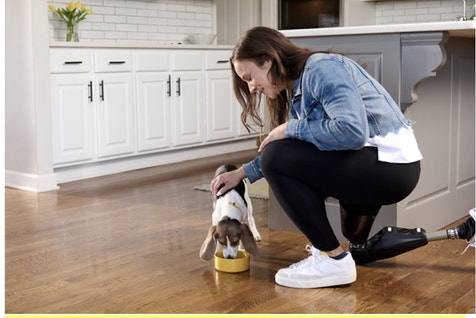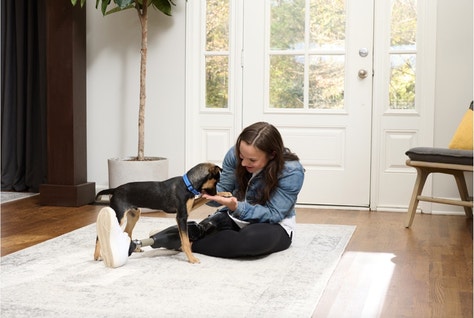
How to Choose the Right Dog for Your Family
So you've decided it's time to add a furry family member to your pack. Wonderful! Adopting a dog can be an incredibly rewarding experience. But how do you choose the right dog for your family and lifestyle?
Whether or not you have children, what type of property you live in, and previous ownership experience are just a few things to consider before making your decision. In this article, we'll walk you through some deciding factors such as size, energy level, temperament, and trainability to help ensure you end up with a faithful companion that’ll fit right in.
Evaluate Your Current Lifestyle
Finding the right dog for your family can be an exciting but challenging task. With so many adorable faces and wagging tails to choose from, it's easy to be swept away by the sheer joy of bringing a new furry friend into your life. However, to ensure a harmonious and lasting relationship, it's important to consider certain factors that align with your lifestyle.
Your daily routine and schedule:
When contemplating bringing a dog into your life, you’ll need to assess your daily routine and schedule. If you spend long hours away from home, it’s worth seriously considering if you can dedicate your time to a breed or a rescue pooch who might be more prone to separation anxiety or need more attention. Dogs, like humans, thrive on routine and companionship, so choosing a pet that aligns with your lifestyle will contribute to a happier and healthier relationship.
How much living space there is:
The size of your living space plays a significant role in determining the suitable canine companion. Larger breeds such as Labrador Retrievers or German Shepherds typically require more room to roam and exercise. Smaller breeds like Chihuahuas may adapt more comfortably to confined areas such as apartments. Assessing your living space and choosing a dog that fits well within it ensures your pet's well-being and your own.
Where - and how often - you can exercise your dog:
Consider the time and commitment you can dedicate to outdoor activities. High-energy breeds, including Border Collies or Australian Shepherds, thrive on daily exercise and mental stimulation. Such breeds may be a good match if you enjoy an active lifestyle and can invest time in regular walks, runs, or play sessions. Understanding your exercise routine is crucial in selecting a dog with compatible needs. To learn more about the unique characteristics of mixed breeds, you might consider genetic testing via Wisdom Panel.
Family dynamics:
The dynamics of your household are essential when choosing a dog. Take into account the ages and activity levels of family members. While it really does depend on the individual, some dog breeds are known for their gentle nature and compatibility with children, while others may be better suited for households with adults. Matching the dog's temperament with the dynamics of your family enhances the likelihood of a harmonious coexistence.
Allocated time for grooming and training:
Every dog requires grooming and training, but the level of attention can vary significantly from dog to dog. Long-haired breeds such as Shih Tzus or Poodles may need frequent grooming, while other dogs may be more independent and require less maintenance. Additionally, the time commitment for training varies: certain breeds are known for their intelligence and ease of training, while others may require more patience and effort. Assessing your ability to invest time in grooming and training is crucial for the well-being of your future pet.
How to Choose a Dog to Adopt

Choosing a dog that matches your family's lifestyle is key. Some things to consider are size, energy level, and temperament.
Size:
Size is important especially if you have small children or live in an apartment or smaller home. Large breeds require more space and eat more food, while smaller dogs adapt better to less space and tighter budgets. Think about how much room you have for a dog bed, crate, and exercise.
Energy levels:
Some dogs need constant activity and attention, while others prefer lounging around the house. Consider energetic breeds like Retrievers or Shepherds if you want a running buddy. For a calmer companion, try Cavalier King Charles Spaniels or Greyhounds. Ensure you can properly exercise and stimulate any dog you get to avoid behavioral issues.
Age:
Older dogs often have medical issues that come with age such as joint pain, diminished eyesight or hearing, or cognitive decline. Senior dogs require extra patience, attention, and funds to keep them healthy and comfortable in their golden years. Make sure any age-related medical needs are within your abilities before adopting an older dog.
Temperament:
A dog's temperament determines how friendly, protective, or independent they are. If you want a social butterfly, go for a Golden Retriever or Beagle. For a guard dog, consider a German Shepherd or Doberman. Some dogs like Siberian Huskies or Chow Chows tend to be more aloof. Think about what temperament would suit your needs and experience level.
There's a perfect dog out there for every family. Make sure to do plenty of research and meet with your rescue in person before determining what dog is the best match for you. With the right choice and preparation, you'll have a happy household with your new family member in no time.
A Closer Look at Different Breed Temperaments
When considering what type of dog to bring into your family, it’s a good idea to research different breed temperaments. Some dogs have lots of energy and require constant stimulation, while others prefer lounging around and cuddling up next to you on the couch. Think about your activity level and how much time you must devote to exercising and playing with a new pup. However, it’s worth noting that you often won’t find pure breeds when adopting a dog, so you might want to look for these specific breeds within their mix.
High-energy breeds:
If you're an active person who enjoys outdoor adventures, high-energy breeds like Border Collies, Siberian Huskies, and Dalmatians may be a great match. However, their playful personalities require daily exercise, playtime, and mental stimulation. Without it, they may become bored and anxious and develop behavioral issues.
Moderate-energy breeds:
For a balance of playfulness and relaxation, consider breeds with moderate energy levels, such as Labrador Retrievers, Beagles, or Pembroke Welsh Corgis. They enjoy outdoor activities and playing with their families but also nap frequently and lounge around. These breeds typically do well with a 30-60 minute walk each day and some playtime. They can make great companions for a range of lifestyles.
Low-energy breeds:
If you're looking for a furry cuddle companion, low-energy breeds like Cavalier King Charles Spaniels, Greyhounds, or Basset Hounds are perfect. While they enjoy short walks and light play, they mostly want to nap, lounge, and snuggle up next to you. Minimal exercise requirements are ideal for less active owners or families with young children. However, their tendency to overeat and gain weight requires diet monitoring.
Considering a breed's natural temperament and energy level will help you find a faithful friend that fits perfectly into your lifestyle.
Other Factors to Consider
When bringing a rescue dog into your family, it's important to factor in health needs or special care they may require. Some dogs have chronic medical conditions or disabilities that require ongoing treatment and monitoring. An advantage of adopting a dog is that you get to know their medical history, and any concerns will likely have been treated. Make sure you understand the level of care and financial commitment needed to properly care for dogs with special needs before adoption.
Allergies:
Many dogs suffer from environmental or food allergies that can cause skin irritation, digestive issues, and other problems. Food allergies may require a special hypoallergenic diet. Environmental allergies are often managed with medication and frequent bathing. Be prepared to work closely with your vet to determine the cause of any allergic reactions and find an effective treatment plan.
Pre-existing medical conditions:
Some dogs come with pre-existing medical conditions such as diabetes, epilepsy, or arthritis that require daily medication or treatment. These dogs can still make great companions, but you must commit to properly managing their condition under veterinary guidance. The costs of any prescription medication, special diets, or other care must be factored into your budget.
Questions to Ask Before Adopting a Dog

Before bringing a new dog into your home, there are some important questions you should ask yourself. Adding a furry family member is a big commitment, so ensuring you're ready is key.
Do you have time for a dog?
Dogs require daily exercise, play, training, and bonding. Can you and your family commit the time needed to care for a dog properly? If not, a lower-energy breed may be better suited for your lifestyle.
Do you have enough space?
The size of your home and yard is important when choosing a dog. Large breeds need more room to move around, while small breeds can do well in apartments. Think about how much indoor and outdoor space you can provide. If you don't have a yard, are you willing to walk your dog multiple times a day? Dogs need time outside, so consider if you're able to commit to multiple walks per day or if a yard is essential.
Can you afford it?
The initial cost of a dog is often small compared to lifetime care. Can you afford nutritious food, medical care, grooming, training, and other essentials? Take a look at this article to find out more about the cost of dog adoption.
Do you have experience with dogs?
If you've never had a dog before, consider an easier breed for beginners. Some breeds require more work and patience. Talk to the shelter staff for breed recommendations based on your experience level.
Will they get along with children or other pets?
Look for a breed known to be good with children and other pets. Proper introduction and supervision are still important, but some breeds are naturally more tolerant and patient.
Thinking through these questions will help ensure you find a dog that fits well with your lifestyle. The perfect dog for you is out there; you just have to be ready to welcome them into your home!
Understanding Your New Family Member
Bringing a rescue or adopted dog into your home is a special journey filled with love and companionship. Once you have chosen the right dog for you, understanding their unique needs and experiences will be essential for a smooth integration into your family.
Background and trauma:
Rescue dogs often come with unknown histories or may have experienced trauma. Being patient and understanding is crucial as your new furry friend adjusts to their new environment. Some rescue dogs may initially display fear, anxiety, or shyness. Creating a calm and reassuring atmosphere can help them build trust and feel secure.
Socialization and training:
Rescue dogs may not have had the same socialization and training experiences as puppies from breeders. Positive reinforcement training methods work well with these dogs and helps to build their confidence and strengthen bonds. Consistent routines and clear communication can aid in their adjustment to a new family dynamic.
Observing behavior and communication:
Pay close attention to your rescue dog's behavior and communication signals. Some dogs may need time to warm up to new people or situations, while others might be more outgoing.
Understanding their body language, vocalizations, and overall behavior will help you tailor your approach to their individual needs.
Potential health issues:
Rescue dogs may have existing health conditions and working closely with your vet to address any concerns is essential. Regular veterinary check-ups, a balanced diet, and appropriate exercise are crucial for their overall well-being. Be prepared for possible behavioral challenges that could arise from previous neglect or mistreatment.
Creating a safe haven:
Establish a designated safe space within your home where your rescue dog can retreat if they feel overwhelmed. This provides them with a sense of security and control. Gradually introduce them to different areas of your home, allowing them to explore at their own pace.
Building trust and bonding:
Building trust is a gradual process. Spend quality time engaging in activities your dog enjoys, whether it's playtime, walks, or simply relaxing together. Patience, consistency, and positive reinforcement will strengthen your bond with your new adopted dog.
So there you have it, the key things to remember when choosing a new dog for your family. Whether you end up with a big, goofy Labrador or a tiny but feisty Yorkie, the most important thing is opening your heart and home to a rescue dog needing love. Once you find your new best friend, prepare for many cuddles, wagging tails, and lots of playtime. The work you put in now to find the right rescue dog will pay off for years to come. Happy adopting!




